The ‘Blade Runner 2049’ Exit Survey
Are you real? Do you know if K was a replicant or not? Can you explain what Jared Leto was doing in this movie? After seeing the much-anticipated sequel to ‘Blade Runner,’ the Ringer staff answered a series of questions. Think of it as an updated Voight-Kampff test.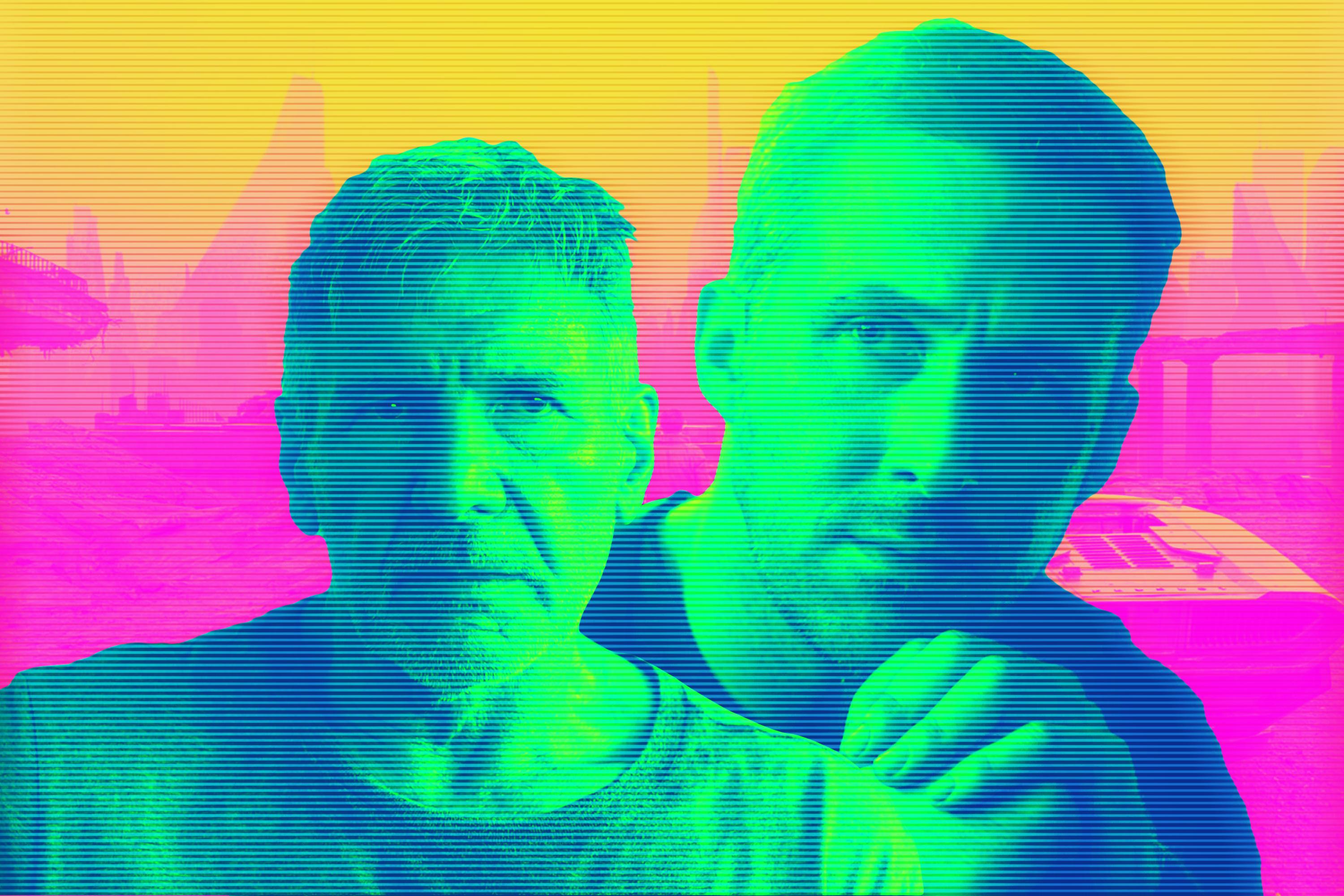
After months of trailers and stories about Harrison Ford accidentally punching Ryan Gosling, Denis Villeneuve’s much-anticipated sequel Blade Runner 2049 was released Friday. And boy is there a lot to unpack. We need to talk Gosling, we need to talk Ford, we need to talk about all of that futuristic fashion. Most of all, we need to talk about if any of us are even real. After seeing the movie over the weekend, the Ringer staff came together to do just that.
1. What is your tweet-length review of Blade Runner 2049?
Amanda Dobbins: I have some questions.
Alyssa Bereznak: Good movie, especially the part that was shot in an Orange Crush Instagram filter.
Miles Surrey: The kind of ambitious sci-fi movie Hollywood rarely makes anymore, and probably won’t again since no one went to see it.
Daniel Chin: I can’t believe they made a nearly three-hour sequel to Blade Runner.
Sean Fennessey: A beautiful painting, a decent movie, an unfinished puzzle, a bad tweet.
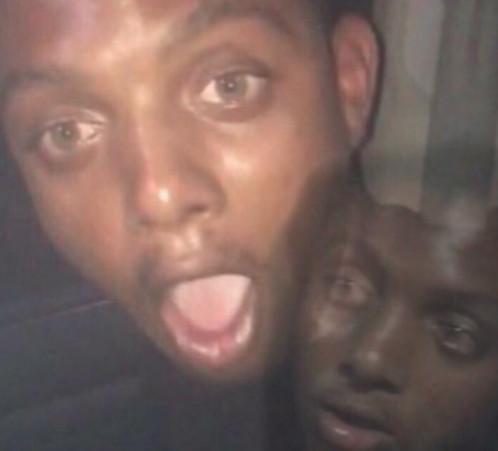
Andrew Gruttadaro: Roger Deakins Flu Game.
Sean Yoo: Denis Villeneuve expands Ridley Scott’s world with revamped visuals and a boisterous score, and it leaves you with even more questions than the first movie.
K. Austin Collins: Blade Runner should’ve been Blade Funner.
Mallory Rubin: It made me feel and it made me think—and not just about that darling dog’s deeply concerning Johnnie Walker Black habit.
Chris Ryan: That was like an Epcot Center ride designed by Thom Yorke instead of Walt Disney. And I love Epcot Center (and Radiohead).
2. What was the best moment of the movie?
Gruttadaro: When Deckard poured scotch on the floor for his very good dog.
Yoo: Spoilerz: The final fight scene was spectacular. Sylvia Hoeks’s performance as Luv was legit terrifying, and I honestly felt relieved when Gosling choked her out.
Collins: The epic final water fight by the dam, with all those splashing waves and piercing flares of light, is an obvious high point for all involved: Gosling gets to throw his dukes up, Hans Zimmer gets to act a fool, and cinematographer Roger Deakins gets to show why he’s the best in the business.
Chin: The scene where you’re introduced to Joi. The way they revealed her nature and her capabilities was really clever.
Surrey: The surreal love scene among K, Joi, and Mariette. Since Joi is a commercialized hologram, she isn’t even granted the illusion of freedom that K is privy to as a replicant. But her individuality shines in this scene; her hologram doesn’t fully sync up with Mariette’s body because she wants to feel K with her own hands. How much of this is Joi as a sentient thing, and how much of it is in her programming? Is she, like K and the other replicants, capable of having a soul?
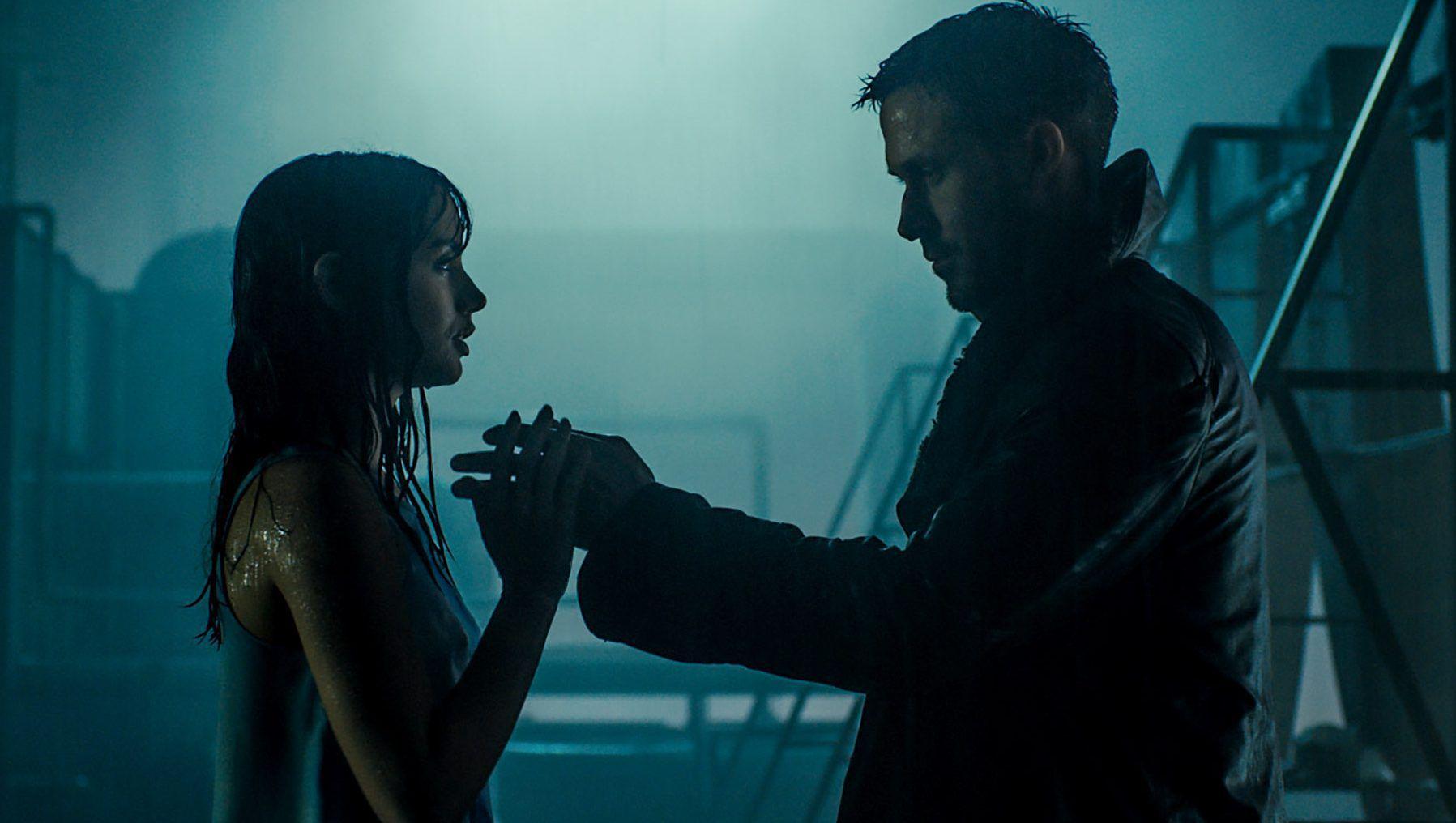
Rubin: Joi’s death hit me harder than anything else in the film. She wanted to be a real girl, and in a story that hinges on exploring what being “real” means, it matters that we feel the stakes so keenly when Luv’s boot crunches down on Joi’s shell and K’s eyes fill with an unmistakably human despair.
Ryan: Ford and Gosling getting the dystopian rat pack together in a radioactive Las Vegas is worth the two hours and 43 minutes of running time, but Gosling and Robin Wright had even better chemistry. Their scene together in K’s apartment, as she drowns her sorrows, and makes a pass at her synthetic subordinate, as he talks about implanted memories felt like the liveliest part of a movie where almost every character acts like a robot, even if they aren’t a replicant.
Dobbins: I can’t believe it took two full hours to get to it, but: the fight scene in the casino, with the Elvis hologram and the knowledge that Harrison Ford really punched Ryan Gosling IRL. Moody atmospherics are great, but so are normal movies with jokes and human (I think, don't @ me) characters and stuff.
Fennessey: The long, long wait for Ford’s arrival, culminating in a cheeky quote from Treasure Island, followed by a long stretch in which Ford punches Gosling repeatedly while a holographic Elvis Presley performs.
Peters: “Sometimes to love someone [deep, pained breath, widen eyes for effect] ... you gotta be a stranger.”
Bereznak: The K-versus–Rick Deckard fight in the casino showroom was just the right balance of heavy symbolism, seizure-inducing lighting, and straight brawling. In the moments when the holograms malfunctioned and went silent, I was reminded of the absurd and frequently isolating effects of attempting to live alongside technology. Like, these two are trying to hunt and kill each other, and Elvis is silently swiveling his hips in the background. Also, thanks to a fruitful Blade Runner 2049 press tour, I couldn’t stop thinking about how this was the scene where Harrison Ford “accidentally” punched Ryan Gosling:
That photo is a treasure.
3. What was your least favorite part?
Collins: Anytime Jared Leto was onscreen.
Fennessey: Whatever it was that Leto was doing, and whatever his motivations were, and whatever the grand plan was, I certainly can’t tell.
Chin: Probably the end. For such an unnecessarily long movie, I thought the ending was abrupt. I also don’t know how that’s possible.
Surrey: The scenes with Jared Leto—which, thankfully, there were only two. Still, they were both excruciatingly long and featured incoherent philosophical ramblings that I couldn’t even care to follow. A kid sitting near me in the theater, speaking for everyone, asked his dad if the first Leto scene was over yet three separate times.
Ryan: The “sex” scene. That was a 20-minute (or at least it felt that long) detour just to get a tracking device in K’s coat pocket.
Bereznak: I know this may have been an intentional effect of portraying a Her-like program whose entire purpose is to make a person happy, but every scene between K and Joi felt like a long, vapid perfume commercial.
Dobbins: The water fight at the end. Where did the water come from? Where is this “home” that they were going to? Why were they even fighting, really? The third act got away from me a little bit (a lot); that said, I really enjoyed when Luv yelled, “I’m the best one,” and dove into the waves. I look forward to using that as a GIF in like three months.
Peters: The sex scene which—while there’s probably something really Smart and Film School to be said for it—didn’t need to have so many hands.
Yoo: That sex scene went on for way too long.
Rubin: The underground insta-army reveal. I like a melon-baller-to-the-tagged-eyeball twist as much as the next moviegoer, and there were enough hints of Freysa throughout the film to guarantee that she’d play some part in the end game. But as her replicant minions surfaced from the shadows, the scene screamed, “We’re setting up a sequel,” so loudly it overshadowed the fact that Freysa was telling K something that fundamentally altered everything he had come to believe.
Gruttadaro: Jared Leto’s android-placenta-covered hands.
4. Who was the MVP of the movie?
Ryan: Robin Wright’s hair.
Peters: SYYYYYYYYYYYYNTTTTTTTHHHHHHHHSSSSSS.
Yoo: Harrison Ford! My man was in only a third of the movie, got billed as the second lead, and sat on a chair for the entirety of the most climactic scene! And best of all, he joined a massive sequel without breaking his leg.
Chin: Joi definitely stole the show. Either her or Deckard’s dog.
Fennessey: Ford, followed closely by Ana de Armas, who was given a blank role of a subservient technological pleasure machine and turned it into something more human than human.
Collins: Roger Deakins.
Gruttadaro: Not only should Deakins get an Oscar for Best Cinematography, he should also just get random Oscars. Here’s Best Adapted Screenplay. I guess you can have Best Supporting Actor too, why not? Mark Rylance already has one. He was that good, and the beauty and life he brought to 2049 gave Villeneuve a lot more rope.
Surrey: It blows my mind that one of the best cinematographers working today has never won an Oscar, but if there’s any justice to be had at next year’s ceremony, 2049 is finally the film that will do it for Deakins. Each set piece is so sumptuous and mind-numbingly beautiful it borders on distracting.
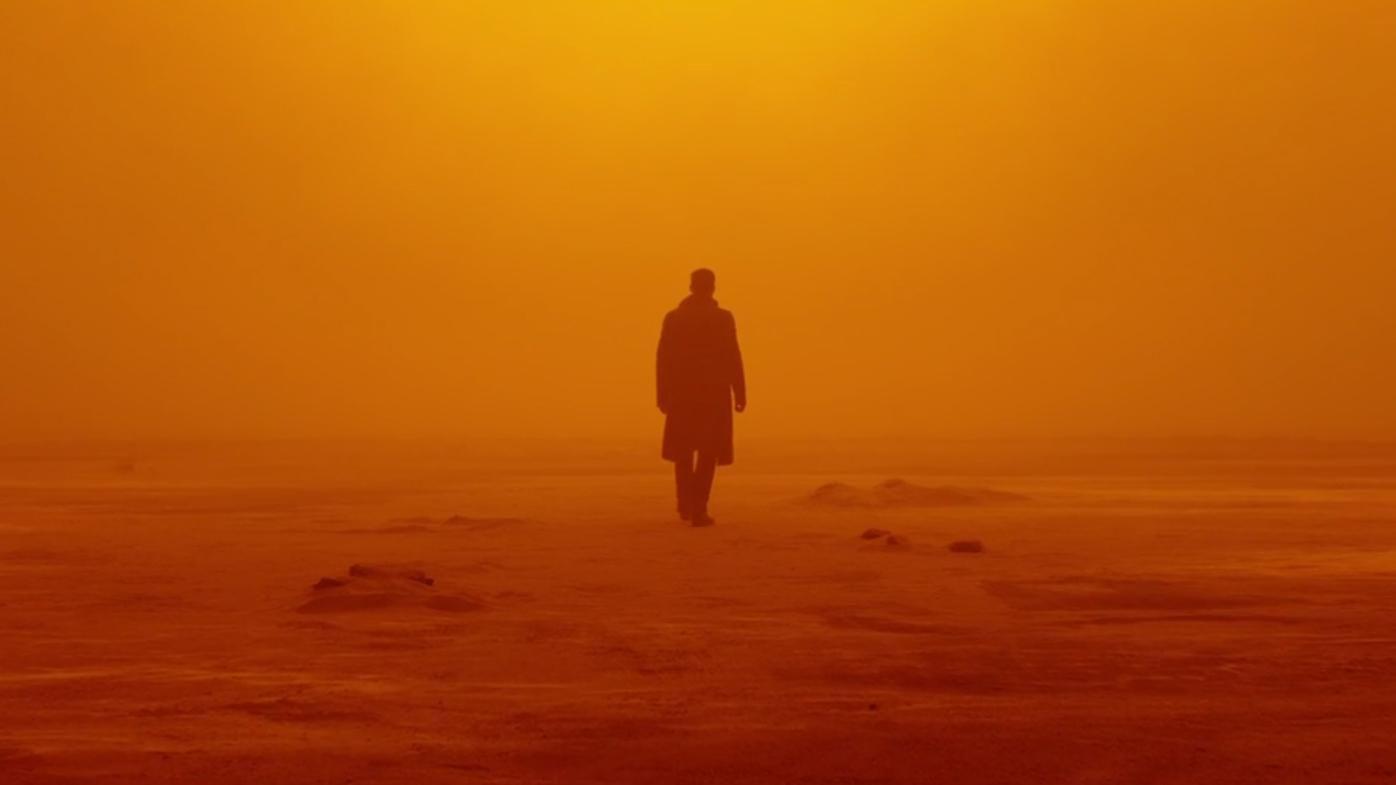
Rubin: Robin Wright was so forceful that she turned on a high-security computer system even after she died. Also, get back to me when anyone else on our earth or the postapocalyptic one featured in this film holds a shattered glass without ever letting a single hair fall out of place.
Dobbins: Gosling is the MVP of getting me to agree to see this movie; Wright is the MVP of the half of the movie I understood; Deakins is the MVP of getting me to say nice things about it after the fact.
5. Is 2049 a worthy sequel to Blade Runner?
Peters: Gaff was in it roasting people with origami, so yes.
Chin: Definitely a worthy sequel, at least. I’ve seen too many terrible sequels to say otherwise.
Fennessey: In that it prizes style, production design, and ambiguity over all else, yes.
Yoo: Worthy sequel. Please don’t compare it to the original.
Ryan: The highest compliment I could pay Villeneuve is that never once, over the course of a nearly three hours, did I ever think about Ridley Scott. Villeneuve took one of the most influential, visually distinctive science fiction films of the past 40 years, and he made it his own. And that’s all he had to do. Blade Runner is essentially a sci-fi version of The Big Sleep; feel free to try to decipher it, but it’s more fun to sit back and let it wash over you.
Collins: No, for one simple reason: Blade Runner was a cult hit that made sense to almost no one when it was released; even the perceptive Roger Ebert took a number of years to come around. 2049, on the other hand, is a blockbuster: It literally can’t afford to not be seen or understood, to be too niche or too alienating. It’s a prestige picture pretending to be a genre movie.
Rubin: To which of the seven versions of Blade Runner, sir or madam?
Surrey: I think it surpasses the original. Ridley Scott’s Blade Runner matters more in its influence on anime and science fiction—from Ghost in the Shell to The Matrix. It shouldn’t be placed on this pedestal of sci-fi perfection when the filmmakers couldn’t even agree on whether the main character was a replicant. At least with Blade Runner 2049, this stuff is definitive. (Denis, PLEASE don’t make several director’s cuts in the next few decades!)
6. Finish the sentence: “Jared Leto as Niander Wallace was …”
Bereznak: … a very good excuse for Leto to wear his own clothes in a movie.
Ryan: … the worst part of a movie.
Rubin: … still not as creepy as anything in J.F. Sebastian’s lair.
Peters: … not as exhausting as I thought he’d be!
Surrey: … denied as much screen time as the Joker in Suicide Squad—thank goodness!
Chin: … spooky, but forgettable. He was great in the few scenes he was in, but he got lost somewhere in those two hours and 43 minutes. Also? Suicide Squad still hurts me inside.
Dobbins: … brief. I appreciated that.
Yoo: … good. ... I really hate saying that he was good, but Leto was good.
Fennessey: … no.
7. Coat check: Which character had the best dystopian fashion?
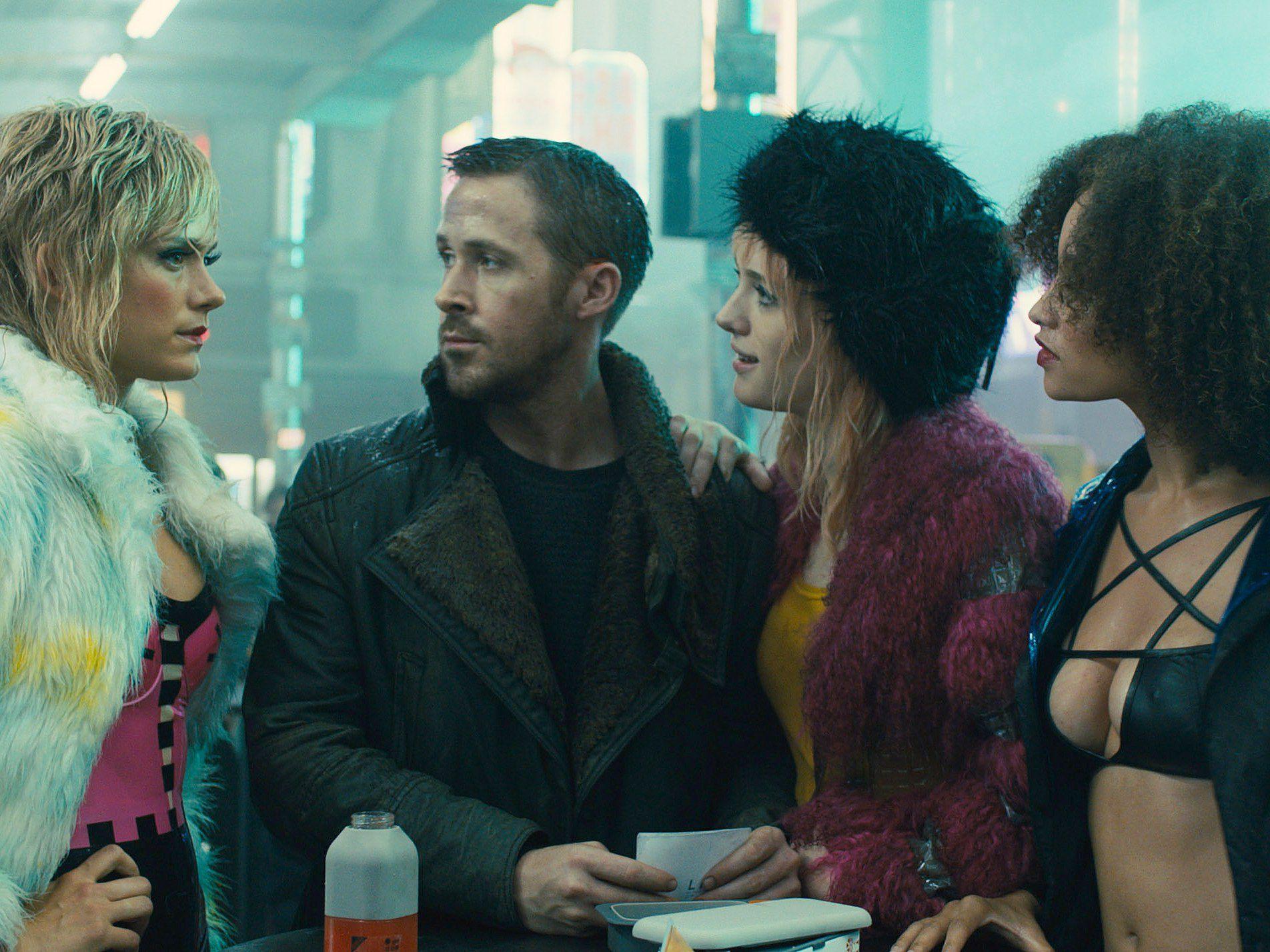
Peters: Listen, I need K’s jacket. For “Halloween.”
Yoo: Ryan Gosling's peacoat with that extended fur-lined collar was fire. 10/10, would cop ASAP.
Fennessey: Many will say Gosling’s shearling-lined black leather number, but I am wondering why all outerwear doesn’t feature the half-face-covering collared coat he’s sporting in the opening scene with Dave Bautista.
Chin: I’ll go with Deckard. It may not have been the most fashionable, but I wouldn’t be wearing much more than a sweaty T-shirt if the world around me looked like that either.
Bereznak: Wow, I am so glad you asked. I appreciated the severity of Luv’s bone-stealing outfit, both the asymmetrical white puffer jacket and the gray, angular Célinelike bag in which she chose to carry the loot. As I previously mentioned, Wallace’s silk black kimono was kind of perfect, and also probably something Leto would see on a Gucci runway in real life, then promptly buy (the murky eye contacts really made the outfit!!). Mariette the prostitute had a stylish, ready-to-wear silhouette when she stopped by K’s apartment in that oversized jacket and platform leather boots. But I most enjoyed the sparkly black evening wear Lieutenant Joshi wore when she visited K’s to drink his liquor/hit on him. But you know, Wright wears everything perfectly, so.
Rubin: I feel fairly confident that Mackenzie Davis’s Cameron Howe would wear the same boots on Halt and Catch Fire that Mackenzie Davis’s Mariette wore in Blade Runner 2049. Win.
Gruttadaro: Sorry, everyone else, but Rachael’s coat is still undefeated.
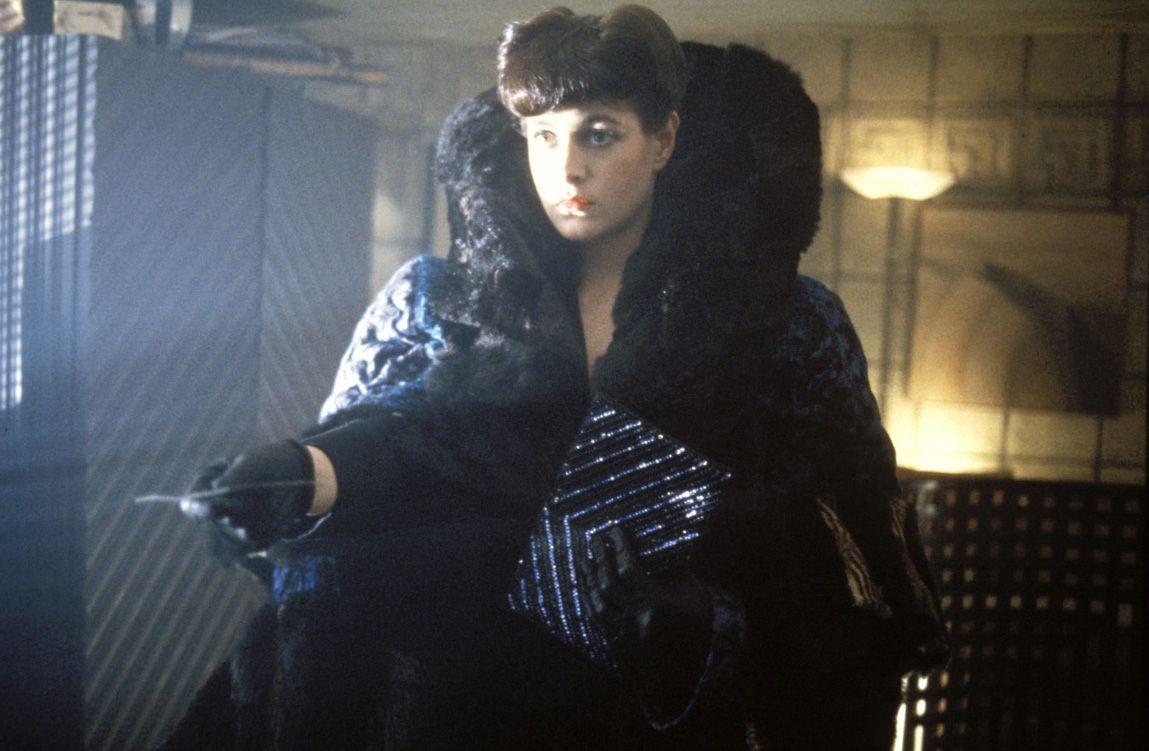
Surrey: Can I say anyone but Harrison Ford? Ford was in a stained Hanes T-shirt. Was it just what he wore to the set? I guess you lose your fashion sense when you’re living in postapocalyptic Las Vegas with nothing but a dog and an endless supply of Johnnie Walker.
Dobbins: They dressed Luv like a 2049 version of Robin Wright’s character from House of Cards, and I’m here for it!
Ryan: Blade Runner 2050: Now What, starring Wood Harris.
8. What did you take away from the ending?
Surrey: That the line between what’s human and what’s artificial is more blurred than ever. Not the most original thesis, but it works as a continuation to the original.
Fennessey: I subscribe to the Mark Millar “it was all her dream” theory. Which is to say, it’s all a construct to reunite replicant father and replicant daughter living in a glass cage.
Bereznak: It’s great that Deckard found his daughter and everything, but I hope that they faked that autoimmune disease. Otherwise it’s going to be hard for her to lead the revolution.
Chin: Deckard is untouchable. This guy’s gonna be in the next one when it’s released in a couple of decades. Harrison Ford will not say no to the money.
Peters: I know this one is about Answerless, Human Questions but I’ve been thinking specifically about how much the last shot mirrors the final one in Cowboy Bebop. Spike also punches out on terrace steps while wearing a really cool jacket.
Rubin: I’m reserving judgment until I’ve seen all seven versions of Blade Runner 2049 and have perfected not only my unicorn origami work, but also my corresponding equestrian woodworking.
Yoo: You don’t have to be a human to live like one? I don’t know, the movie left me with too many existential questions. Was Deckard’s daughter half-replicant, half-human? Is Deckard a replicant?!?! If K thought he was human, but he didn’t end up being human, why did his numbers look off on his final status check?
Dobbins: Haha.
9. Do you know what’s real?
Collins: Yes: those box-office numbers.
Bereznak: My undying love for Ryan Gosling has and always will be, obviously.
Dobbins: The three-hour run time of this movie.
Ryan: Ask Mark Millar.
Gruttadaro: When I walked out of the theater, it was raining, so I stuck out my hand, and there was, like, zero glitching. So I know at least that I’m not a hologram, which is nice.
Rubin: I know that what matters most is being able to ask myself that very question.
Fennessey:
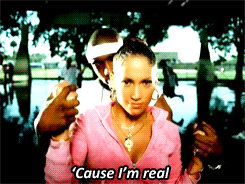
Yoo: No. Am I even real? I feel like I need snowflakes to fall on hands to confirm my existence.
Peters: Respect other people’s privacy, bless up, thank you.
Chin: I opened up my phone after the movie to see that not only did the Giants lose again, but four receivers left the game with injuries, including Odell, who’s going to need surgery. So, no, I really don’t.

